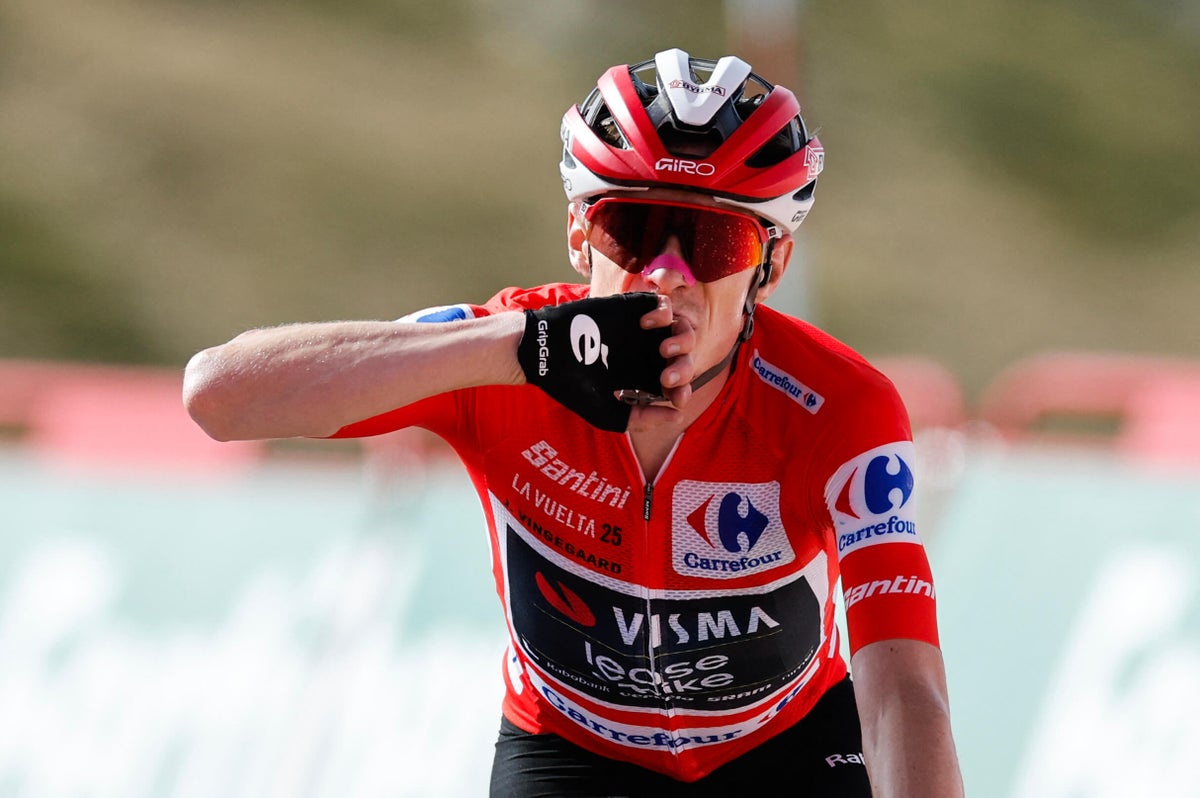The 2025 edition of the Vuelta a Espana concluded on Sunday, a little short of the planned finish line in Madrid.
Jonas Vingegaard (Visma Lease-A-Bike) was this year’s winner, with Joao Almeida (UAE Team Emirates) and Tom Pidcock (Q36.5) rounding out the podium. But the main story for much of the race was the pro-Palestine protests that impacted several stages, with three of them cut short, and others having their routes altered at late notice.
Here, The Athletic’s writers review a complicated three weeks at the final Grand Tour of the year.
Was Jonas Vingegaard a worthy winner of this year’s race?
Jacob Whitehead: Absolutely. Vingegaard never lost time on summit finishes to his GC rivals (outside bonus seconds), and when the race was set to be decided on Bola del Mundo, rode away to cross the line alone. In the end, although the explosivity he built over last winter did not help him beat Tadej Pogacar at July’s Tour de France, it was possibly made the difference in August, with Joao Almeida’s attritional style probably lacking the acceleration needed to put the Dane in serious difficulty. I hope Vingegaard rides the Giro next spring, as he has implied he would like to, in order to attempt the career set.
Jess Hopkins: Yes. Vingegaard’s rivals weren’t exactly in poor shape either, with podium finishers Almeida and Pidcock some of the best form of their lives, but the Dane was a step above. The penultimate stage showed his superior class, as he pulled away convincingly on the toughest climb of the tour to cement his place atop the GC. You could point to the disorganisation of UAE as aiding his win, but even going into the race there was a strong sense that it was his to lose, having come off the back of a second-place finish in the Tour de France with not much racing beforehand. Aside from an uncharacteristic blip where Pidcock dropped him briefly on the eventually neutralised Stage 11, he was never in any real danger.
Duncan Alexander: At the end of the 2023 Tour de France, there was a sense that Vingegaard was about to dominate the sport for the next five years, but Tadej Pogacar’s response to back-to-back reversals at the hands of the Dane ensured that has not been the case. So yes, Vingegaard came into this Vuelta as a favorite, but one with the air of an underdog too, possibly a scenario that suits him. He has now finished first or second in each of the last seven Grand Tours he has ridden — a superb record however you cut it. As Jacob says, a tilt at the Giro d’Italia next May is surely the path he should follow.
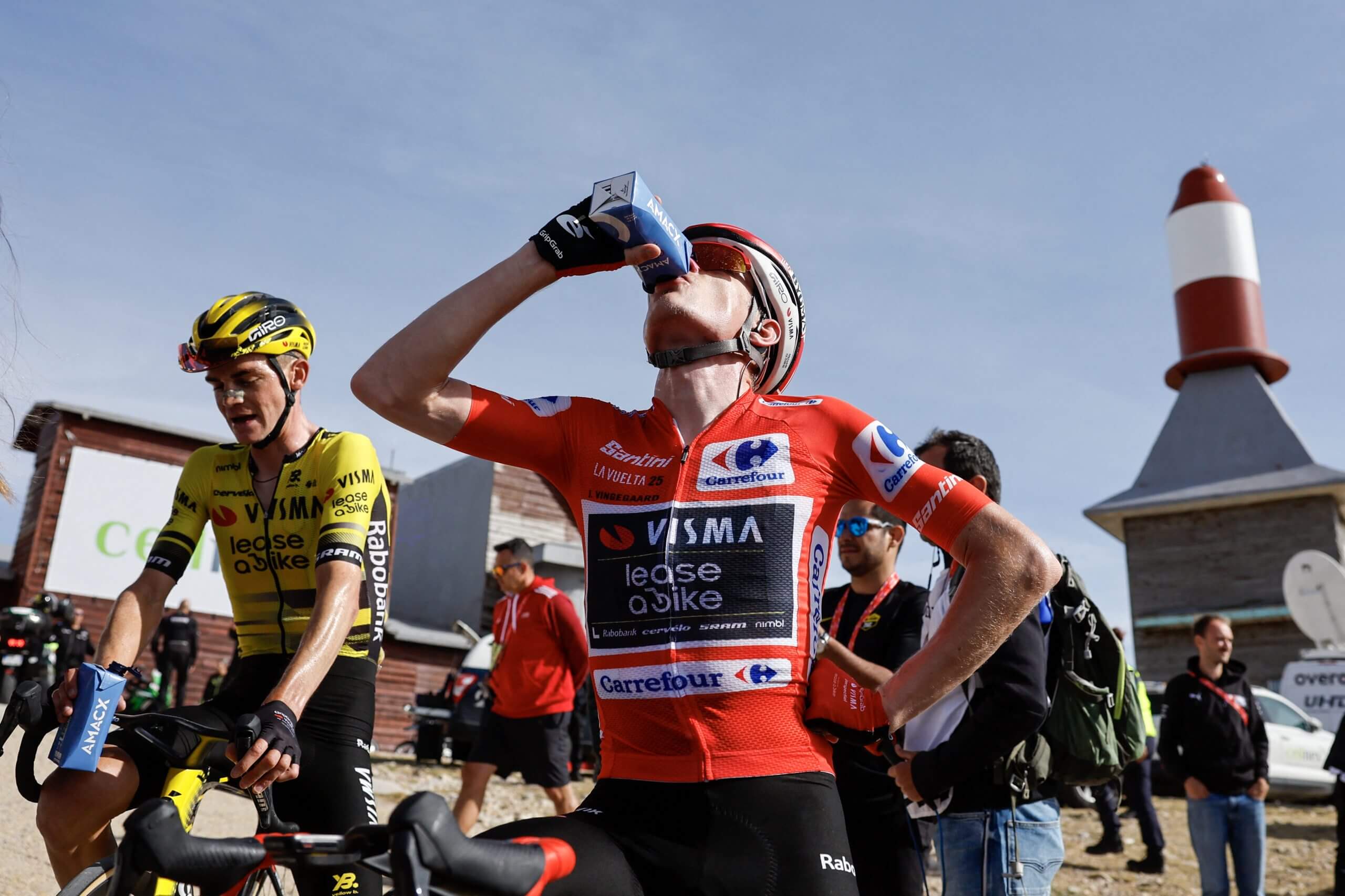
Vingegaard after his decisive win on the Bola del Mundo (Oscar Del Pozo/AFP via Getty Images)Did UAE blow victory by riding too individually?
Jacob: Maybe ‘blow’ is too strong, but UAE Team Emirates did ride like cyclists who just happened to find themselves in the same jersey. The difference from their Tour squad, who were fanatical in their single-minded support of Pogacar, was startling. I think that Marc Soler and Jay Vine’s performances were defendable — though both were chasing stages and jerseys, they did both drop back when needed (though whether their legs were duly compromised is another discussion altogether).
But Juan Ayuso’s performances at this Vuelta were simply incomprehensible. Clearly, by winning two mountainous stages, his legs were in fine fettle — maybe not race-winning condition, but enough to be Almeida’s key worker in the mountains. Instead, as soon as Almeida needed support, Ayuso repeatedly fell back to the gruppetto. We may never know what went on behind closed doors, but the notion that the Spaniard’s legs happened to only be tired on days where he was set to play second fiddle? That’s simply not credible. Ayuso is keen to move teams to one where he can be sole leader — but if I was a potential destination, his teamwork would give me serious cause for concern.
Jess: Even if UAE rode as a well-oiled team, they were still up against a two (now three) time Grand Tour winner, with a host of super-domestiques including the likes of Matteo Jorgensen and Sepp Kuss. Victory was always going to be a hard task. It did feel like, however, they didn’t even give themselves the best chance. Ayuso’s comments that he was “not in the fight for the general classification, so there’s no point in pushing just for the sake of it” summed it up. Vingegaard was within touching distance for much of the Vuelta and Almeida’s win on the Angliru teased the fact that a GC battle could very much be up for grabs. With a bit more help, he could have been even closer.
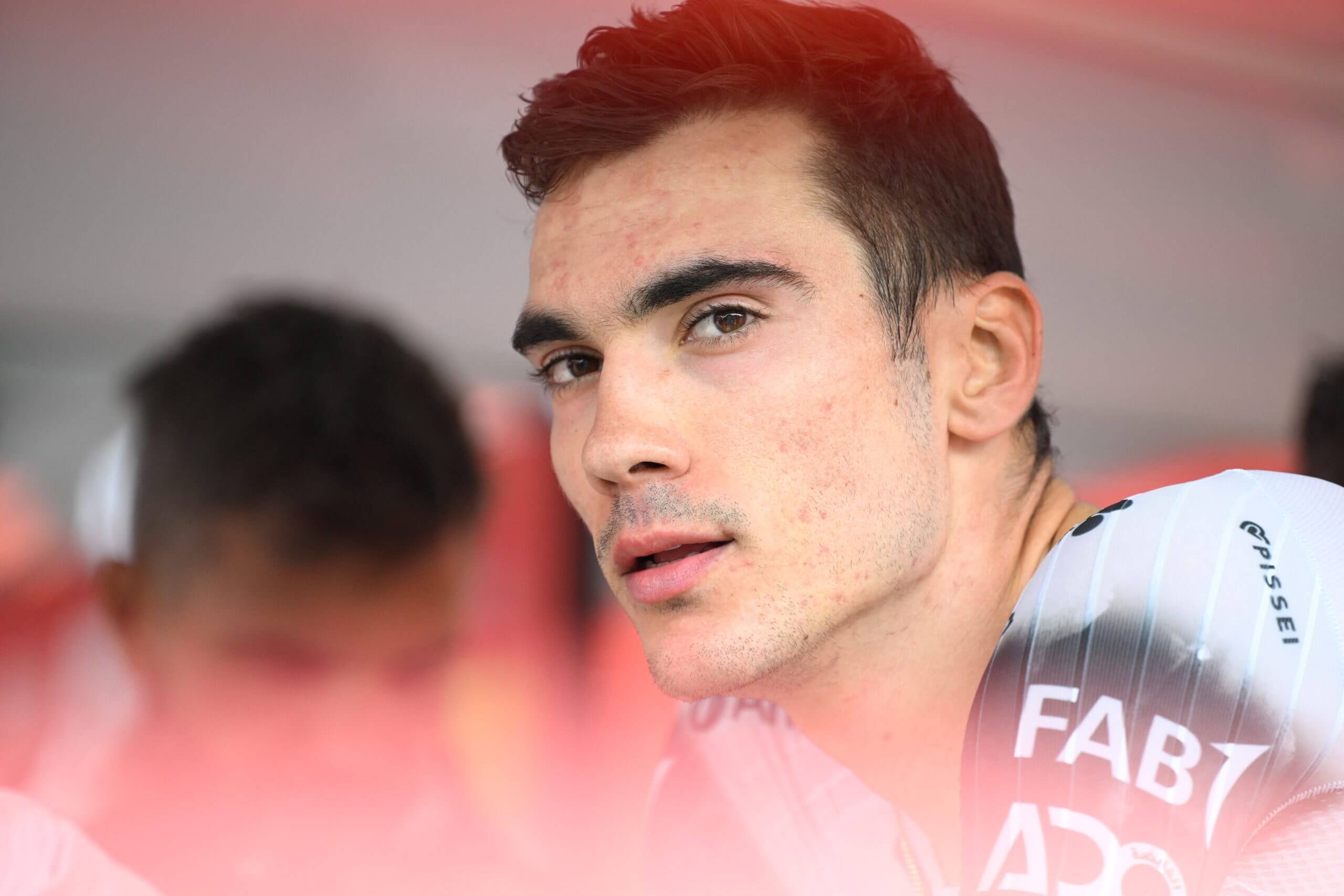
A mixed Vuelta for Juan Ayuso (Josep Lago/AFP via Getty Images)
Duncan: I think you have to remember that UAE put a lot of emphasis on the team element of professional cycling, although perhaps more in the team achievement sense than a team-spirit one. They — once again — have destroyed their rivals in the UCI team ranking, and two non-Vuelta wins on Sunday took them to 85 for the season, matching the annual record set by HTC-Colombia back in 2009. Seven stage wins, the mountains classification, second place in the general classification and first in the team classification is a monumental haul from a single race. Ignore the grumbling and count those UCI points.
What was your favourite stage?
Jacob: I admit it, I’m a sucker for the Vuelta’s stage design. Flat and then a summit finish? It’s what my 12-year-old self would have planned, given the opportunity. That attitude was well-sated by this Vuelta — and the Angliru was its epitome. Almeida’s ascent was arguably the best racing moment — sunglasses off, eyes grimly set on the road ahead, never looking back as the peloton slowly dropped off his wheel. At the end of its cruel ascent, only Vingegaard remained — but was unable to come around Almeida, who took a stunning stage victory. It was the best I’ve ever seen the Portuguese ride. It was also brilliant to see Egan Bernal win in a Grand Tour for the first time since his life-threatening crash — albeit on a protest-affected stage.
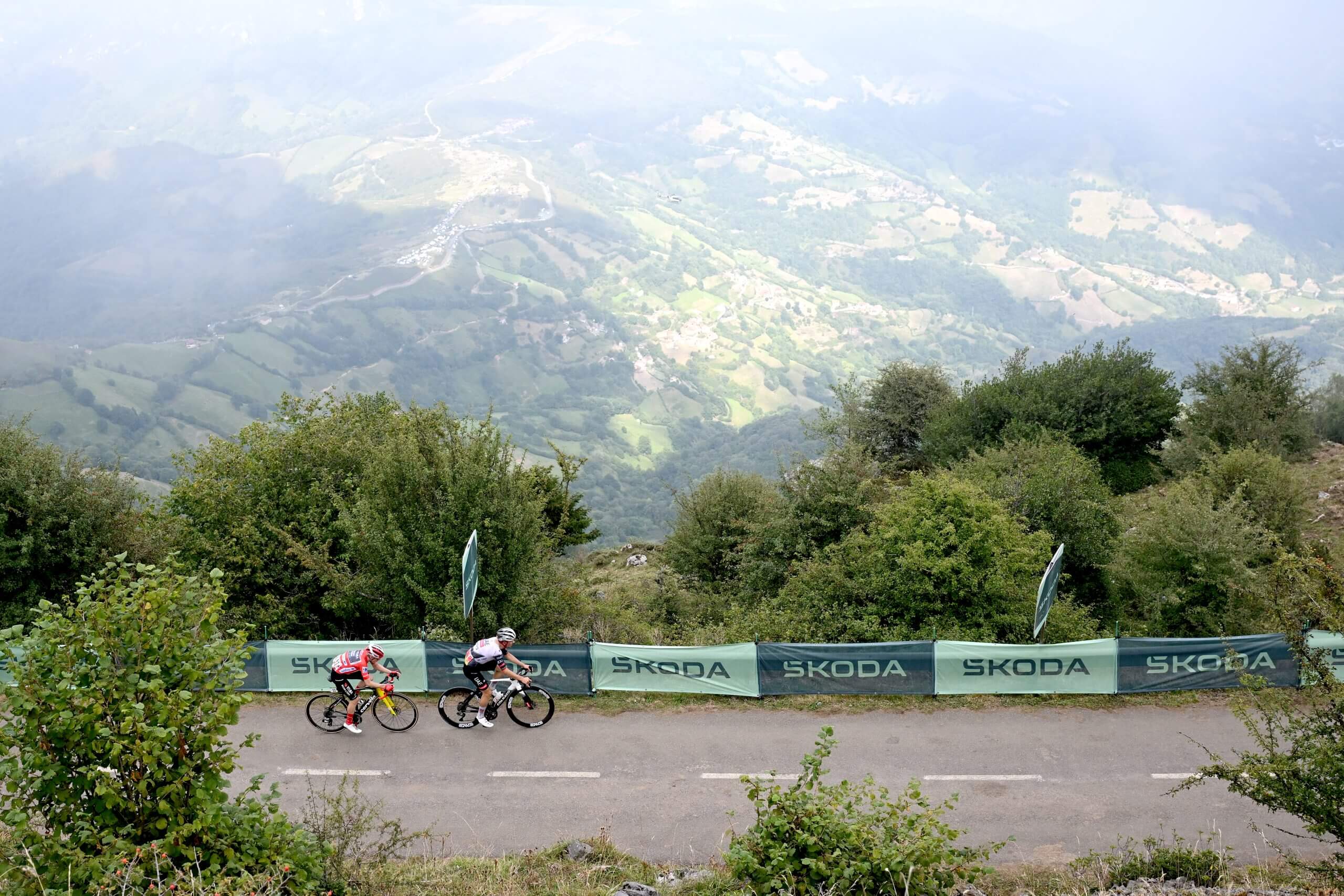
Almeida and Vingegaard creep up the Angliru on stage 13 (Dario Belingheri/Getty Images)
Jess: It’s strong tie between the team time trial and the stage to Bola del Mundo on the final Saturday. It was great to see the return of the lesser-spotted TTT. Before UAE’s leadership squabbles and Vingegaard’s tone-setting solo win on Stage 9, it gave a hope that maybe the dual leadership could work and the Visma leader could be toppled. Equally enjoyable to watch as a neutral, was the stage in which any remaining hope of that was squashed. The final 3.2 kilometres averaged at a 12.2 per cent gradient and the steepest section was 23 per cent, making Vingegaard’s distancing of the rest of his GC rivals seem all the more impressive.
Duncan: Like Jess, I enjoyed the TTT in Salvador Dali’s hometown of Figueres enormously. It’s an aesthetic delight in any race, and we are due to start the 2026 Tour de France with one too. Honourable mentions to stage four when Ben Turner turned into a bunch sprinter and then burst into tears, and to stage 17 which finished up the incredibly bleak yet beautiful Alto de El Morredero, and possibly launched the 21-year-old Giulio Pellizzari into climbing’s top tier.
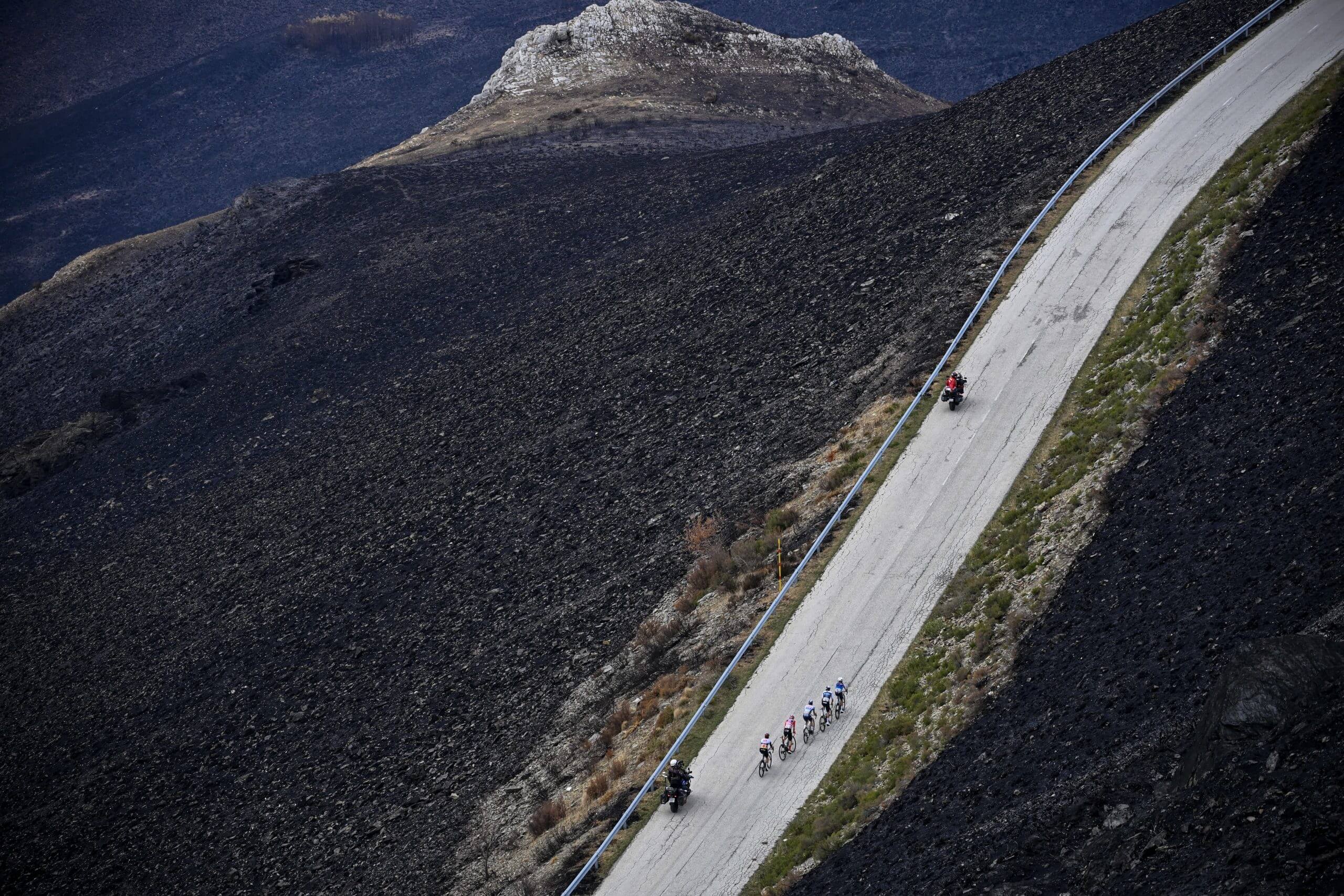
The bleak-yet-beautiful Alto de El Morredero (MIGUEL RIOPA/AFP via Getty Images)Who was your best discovery of the race?
Jacob: Despite the Vuelta’s reputation as a breeding ground for young talent, this really was a race for the big names — wins for Jasper Philipsen, Mads Pedersen, Vingegaard, Filippo Ganna, Ayuso, Almeida… The list goes on. So I am going to say Tom Pidcock — because this is a different Pidcock to the rider we have seen before. This was not an uber-aggressive stage hunter, but a mature GC contender, whose podium was a result I truly did not expect. The result is hugely significant for Q36.5 as they look to elevate themselves to WorldTour level — and is Pidcock’s finest individual ride since last year’s Olympics.
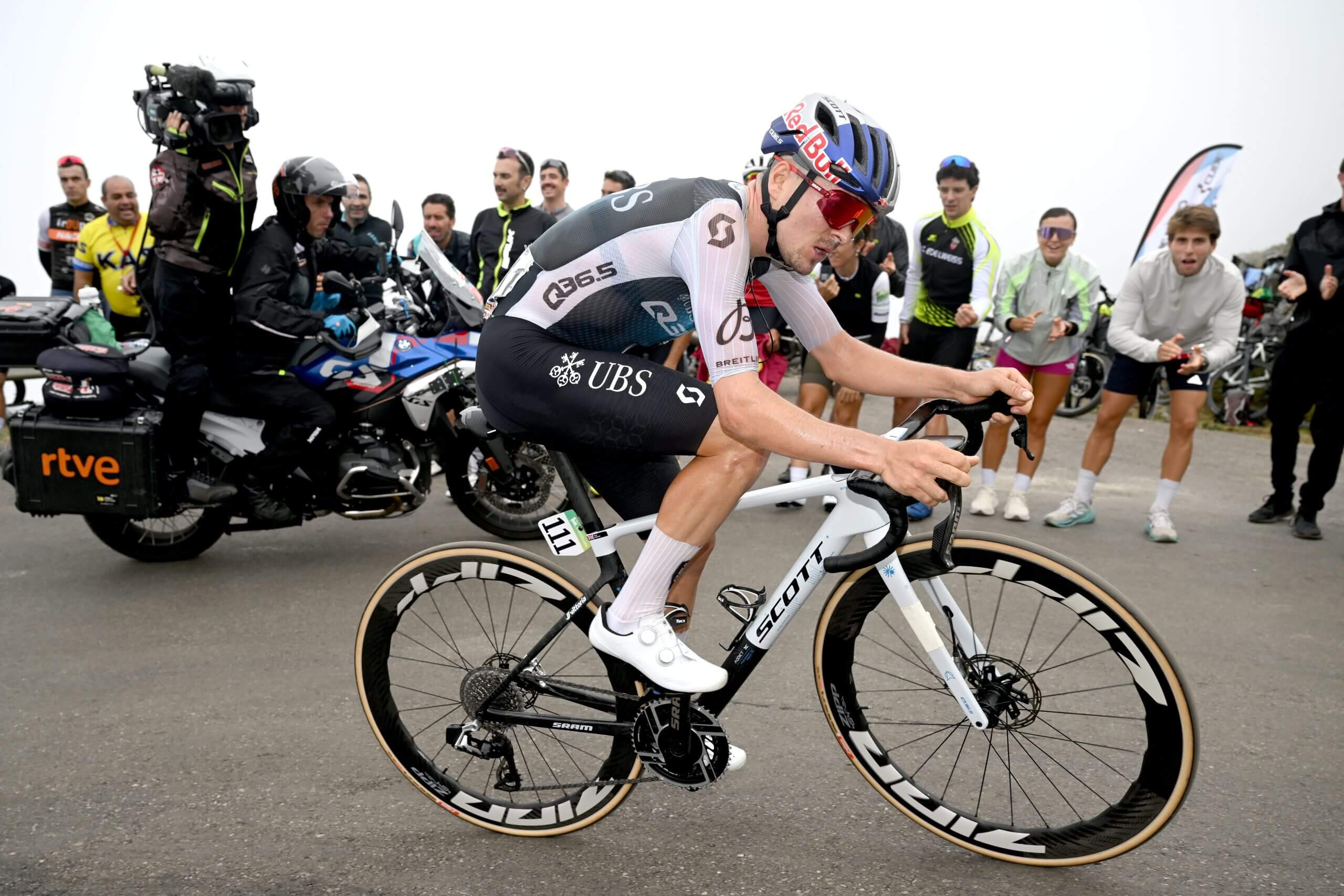
A coming of age performance from Tom Pidcock (Dario Belingheri/Getty Images)
Jess: Israel Premier-Tech’s Matthew Riccitello is not a complete unknown but reminded everyone in this year’s Vuelta why he is one of cycling’s exciting young riders. The 23-year-old came fifth in the 2024 Tour de Suisse GC so is not a complete unknown, but this year’s Vuelta is a big mark of his improvement. The American edged out Red Bull Bora-Hansgrohe’s Giulio Pellizzari in the Bola del Mundo stage to win the white jersey. He also beat the Italian to fifth spot in the GC, above Felix Gall and former red-jersey wearer Torstein Traen, improving by 25 spots from his 2024 outing. With a 2026 transfer to Decathlon CMA CGM announced on Monday, it will be fascinating to see what he can do next.
Duncan: That Lidl-Trek really, really love the points classification at a Grand Tour. Mads Pedersen won the ciclamino jersey at the Giro in May, then Jonathan Milan won green at the Tour de France in July, before Pedersen added another green jersey at the Vuelta. It’s a unique achievement by a men’s team in a single season, and though it doesn’t quite match Visma winning all three general classifications back in 2023, it’s still pretty impressive.
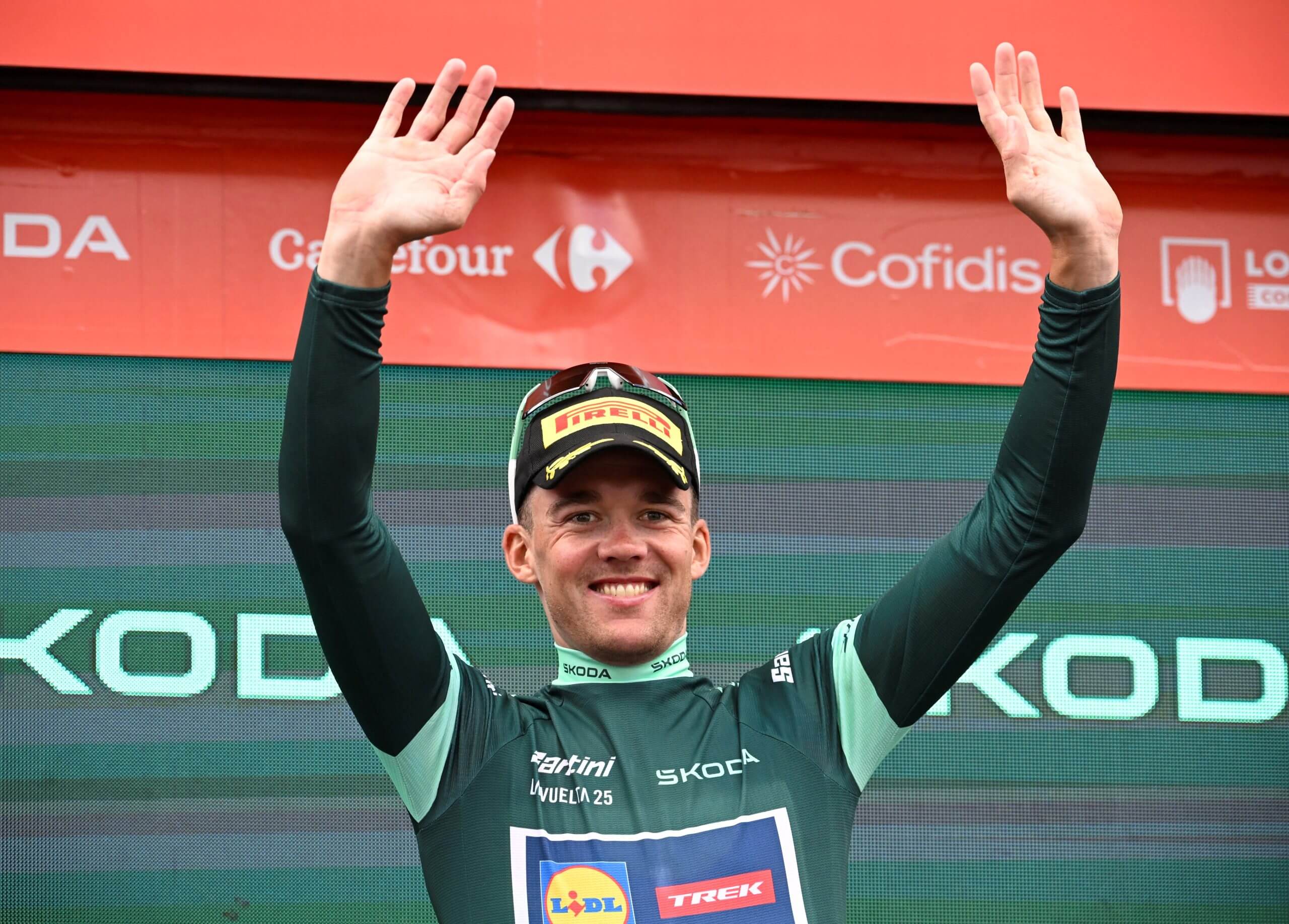
Mads Pedersen celebrates his second Grand Tour points classification win of the season (Miguel Riopa/AFP via Getty Images)What was your biggest disappointment of the race?
Jess: The individual time trial getting cut short. It was the right decision, and it is always worth putting safety first given the potential danger to the rider, especially given how exposed the riders would be, riding individually. But the decision really took the jeopardy out of the stage and to some extent, the final week. As the 18th stage out of 21, it was a real chance for Almeida to gain on Vingegaard and stir up the general classification. With Visma operating as the more effective team, the individual stage could have been a leveller. And it was, to an extent. Almeida did end up gaining around 11 seconds on Vingegaard, but with the length of the TT more than halved, it left a big ‘what if’ …
Jacob: Difficult to say. Antonio Tiberi had a truly awful Vuelta — having appeared he was challenging for the podium at the Giro d’Italia before injury, he seemed a lock for the top 10 here. He is far better than 41st, over two hours back on Vingegaard. I’d have also liked a few more ‘surprise winners’ — the Vuelta is usually where I get my fix of Grand Tour randomness.
Duncan: Stage six of last year’s Vuelta started inside a supermarket in Jerez de la Frontera. Cycling creates traditions out of the strangest things but there was no repeat in 2025. I’d really like to see grocery-store stage starts become a thing.
Today’s stage of La Vuelta starts inside a supermarket…as they do 😅@stephconstand 🎥pic.twitter.com/szsTC2pI62
— ITV Cycling (@itvcycling) August 22, 2024
How will this Vuelta be remembered?
Jess: The 2025 Vuelta contained many admirable sporting moments, but will be remembered for the race-disrupting protests. Sights of protestors and Palestine flags became almost a permanent fixture as the race went on, to not much objection — until it endangered the riders. Javier Romo had to abandon the race due to injuries that were picked up from a crash caused by the sudden emergence of a protestor and the resulting reaction from a police officer. With the lack of protection that riders have when racing and the potentially life-threatening consequences of a crash, the debate changed and the idea of the Vuelta being called off completely loomed large.
My lasting memory of the 2025 Vuelta will be the videos of the riders celebrating the end of the race behind closed doors, in what looked like a car park. Slightly less glamorous than the cancelled public ceremony, the scaled-down intimacy had a simple charm to it that was refreshing to see.
🇪🇸 #LaVuelta25
Poppin’ bottles, Vuelta 2025 style. 🍾🍾 pic.twitter.com/NEk7QM3Env
— Team Visma | Lease a Bike (@vismaleaseabike) September 14, 2025
Jacob: I agree with Jess. It’s impossible to look past the protests and their disruption. Cycling is a unique sport in two ways. The first is that it is ridden on public roads, which makes it part of our lived, real world, and all the difficulties that come with it. When tragedies in the real world are inescapable, cycling is likely to feel its repercussions. This is heightened by the second factor, that cycling, more than most sports, is inherently reliant on sponsorship, which leads to complexities when teams are sponsored by companies linked to nation-states. It is impossible to say that sport is not political — and means that days such as stage 21 will be its defining memory.
Duncan: In truth, professional cycling has always been a canvas for protest, just never to this scale before. It raises organisational questions about the planned Barcelona start to the 2026 Tour de France, but it also reminds us that sport does not take place in isolation from the real world.
(Top photo: Oscar Del Pozo/AFP via Getty Images)
